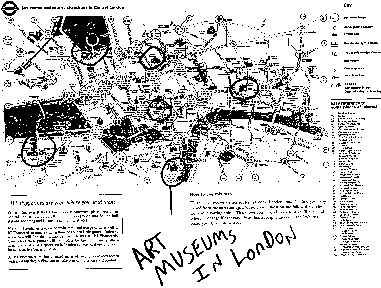

I saw the problem but I could do nothing about IT. I even understood her viewpoint. I never blamed her but I never told her that either. How could I see the problem and not do anything about it? I saw IT. IT was right in front of me. I knew the problem, I recognized IT. IT wasn't enough. I came back home from England with my new knowledge and did nothing She had moved to Colorado Springs. I was back home in Pueblo, just 45 minutes away. I never saw her again or maybe I did. IT doesn't matter, because I did nothing.
Zeno's Paradox: The space between two objects may be infinitely divided in half
Rape Is an Abuse of Power
In Space, Place, and Gender Doreen Massey relates an experience of going to an art gallery with two male friends. She notices that the nude paintings they are looking at are women painted by men. At this moment space becomes a historical, political, and gender problem. "So I stood there with these two young friends, and they looked at these pictures which were of women seen through the eyes of men, and I looked at them, my two young friends, looking at pictures of naked women as seen through the eyes of men. And I felt objectified. This was a space that clearly let me know something, and something ignominious, about what High Culture thought was my place in society" (Massey 186).

I met Nora under the Lambeth Bridge on my way to see the Royal Shakespeare company perform A Winters Tale. She was a squatter begging for money. She said hello, so I said hello. I sat down beside her and talked to her. She was 19 years old (I was 20), and from Dublin (I was from Pueblo). She had a daughter who was back at the warehouse she was squatting in. There was no space between us. We talked to each other as one talks to oneself She asked me where I was headed. I told her to see a play, then I asked her to join me. She did. I bought some cancellation tickets and we went in and sat down next to an English Gentleman in a Tux. He sneered at us as only an English Gentleman could. I couldn't tell if it was the way she smelled or the fact that an Irish refugee and an American tourist had the audacity to sit next to such fine English blood. The arm rest between him and Nora was a universe away. Shakespeare must have been pleased that night.
Men say that:
Doreen Massey's comments on the postmodern perspective seem particularly revealing and important to the issue of women's writing. She observes the key problem of postmodernism as being an error in the assumption that if the object is acknowledged then an empowering of the object follows,
One of the main attractions of the postmodern perspective is that it would seem on initial viewing to offer the prospect of a greater democracy through its recognition of the reality of a variety of viewpoints, a plurality of cultures. This has its underside: those viewpoints and cultures may, for example, run counter to what we have been accustomed, from a modernist perspective, to think of as progressive, and postmodernism forbids us from evaluating. Moreover, as Harvey argues very well, "mere recognition of the existence of something does not empower it" (Massey 214).
Yes, women have been marginalized in a patriarchal society. Yes, they have been dictated to, degraded, and forced into subservient literary positions. It isn't enough. The old space must be destroyed and a new one created. The use of space in ways never used before breaks down the patriarchy. A lack of expectation allows advancement, possibility, and resistance. This empowerment and action should not be just confined to women. If men embrace the patriarchy they are embracing a stagnant, dead discourse. They are placing themselves in a rank still water pool of murky filth. They are drowning in tradition. Recognition just isn't enough.

| Lacan says, "All naming is already murder." This is only a half truth. Sometimes naming is just a life sentence confining one to "public" space I remember the first time I was at a concert and had to go to The bathroom. The MENS restroom was moving quickly while the womens had a long line reaching around the corner. I went in and stepped up to the wall urinal, unzipped my pants, and began to pee. Just then three women walked in and went to the stalls behind me. I stopped peeing in mid-stream. I was nervous, confused, self-aware. Why? Why should I be? |  |
| The stalls were open and they had to pee just as bad as I did. Why would it bother me? Ever since grade school I had been forced into learning a doctrine of space separation between BOYS and GIRLS. Restrooms had strict rules. It was a clear division. BOYS never go in the GIRLS restroom (I did this once and lost playground privileges for a week) and GIRLS don't go into the BOYS restroom. I learned this so well 11 years after Kindergarten I couldn't pee in a MENS restroom when three WOMEN invaded the male PUBLIC space. |
It isn't so much that we broke up. We never did. We never had words of anger ...regret ...release. We tried to be angry but How? Despite our guilt it wasn 't our fault. And it was. GUILT. She moved to Colorado Springs and I went to England for the summer. It was three months. It was an ocean. I had Piccadilly Circus, the Hippodrome, the National, and every night a new play at 15 pounds. I had a 12 hour jump on her and an ocean to prove it. She can't catch me.
When I was twenty-one (a year after I had come back from England) I was dating Jennifer. I met her at a cheesy dance club in Colorado Springs. We ended up meeting at Denny's later that night. We talked well into the next day. We could go dancing almost every weekend. Usually we went to a club called "The Annex." It was known among the right-wing Christians of Colorado Springs as that "gay" bar. Maybe it was and maybe it wasn't, it's hard to say, on the inside everything was just ambiguous ...blurred. Jennifer was bisexual. She had a female lover (Shannon) and she had me (Robert). The three of us would go out together quite a bit. Later my straight (as in narrow-minded) friends would try to understand our relationship but they always would end up thinking it was weird. I didn't understand their objections, after all Jennifer was bisexual it was her nature. Why shouldn't she have a boyfriend and a girlfriend? Now I understand it was a problem of PUBLIC space. The restrooms had merged together and good little boys and good little girls weren't sure what to do. The Annex only had one restroom. The sign on the door read BATHROOM. There was only one door. There were not two doors. I had learned to pee with women in the stalls behind me. But outside the Annex two doors still divide space.
|
MEN
|
PUBLIC
|
WOMEN
|
|
MEN
|
PUBLIC
|
WOMEN
|
|
MEN
|
PUBLIC
|
WOMEN
|
I tried to forget her but I couldn't. How silly it seems. The more you try to forget the more your mind creates space to remember. Ironically it was the time of my life. It must have been the worst of hers. It makes you wonder how you look at other people. I couldn't deal with the GUILT. I fled the country without a letter ...phone call ...good-bye. You think of these guys who can't deal with relationships when they get really intense ...Bastards, that's what I think you call them ...yes I was a bastard. Sometimes when I want to let myself off the hook I call myself Bastard. Justification fills the space.
We Say that:
After the play Nora and I went out for dinner (she paid). We walked back to her place, an abandoned tire manufacturing warehouse. She kissed me softly on the lips. I said goodnight and walked back to my very English hotel run by an old German woman who watched nothing but Elvis movies. There was no regret, no space. Nora and I had the only relationship we possibly could have had. Space became a memory. I remember that single night better than I can certain months or years of my life. E=MC
What remains to be discovered is always so great that everyone can adjust his or her lens at will without necessarily imposing a limit on others.
--Claudine Herrmann

Chapter six in Gaston Bachelard's The Poetics of Space deals with the concept of "corners." The chapter focuses on how comers are a dosing off point for the individual. Bachelard states,
The point of departure of my reflection is the following: every corner in a house, every angle in a room, every inch of secluded space in which we like to hide, or withdraw into ourselves, is a symbol of solitude for the imagination; that is to say, it is the germ of a room or a house. (Bachelard 136).
The closing of space by confining oneself to a corner is meant to isolate the individual. Bachelard feels this is a way of isolating the imagination as well. "When we recall the hours we have spent in our corners, we remember above all silence, the silence of our thoughts" (Bachelard 137). However, given the physicists perspective on non-existent absolute space the corner no longer becomes a place of isolation. The constant motion and change in the universe denies us the ability to isolate ourselves. Space is always in motion and changes depending on the perspective ofthe individual (i.e. if someone bounces a ball on a train, the ball may only appear to travel only three feet vertically. Yet, if another observer was able to see the ball bounce from a horizontal position, the ball will travel three feet vertically and forty feet horizontally {based on the movement of the train}). Still, even with the,idea of non-existent absolute space Zeno's paradox confines the individual to a constant state of isolation much like the one Bachelard felt the corner provided. If the space between two objects is infinitely divisible then the individual will forever be in a state of isolation, because there will always be space separating one object from another.
Je suis l 'espace ou je suis
(I am the space where I am)
Mais il y a des angles d' ou l' on ne peut plus sortir
(But there are angles from which we cannot escape)
Je suis l 'espace ou je suis
(I am the space where I am)
Mais il y a des angles d' ou l' on ne peut plus sortir
(But there are angles from which we cannot escape)
Je suis l 'espace ou je suis
(I am the space where I am)
Mais il y a des angles d' ou l' on ne peut plus sortir
(But there are angles from which we cannot escape)
The non-existentence of absolute rest therefore meant that one could not give an event an absolute position in space.
--Stephen W. Hawking
The term "space" refers to very different concepts: there is a physical space and a mental space for everyone. These two categories have in common the capacity to be invaded: one by violence, the other by indiscretion.
--Claudine Herrmann
I touched her. She winced. GUILT. I felt like a rapist every time I was close to her. I felt like the man who raped her five weeks earlier. I couldn't even hold her hand without sensing fear. I felt like her Uncle. GUILT. I felt like her Uncle who had raped her five weeks earlier. We tried to talk, but it didn't work. After a man rapes a woman how could I (a man) talk to her (a woman) with any amount of trust, without being conscious of everything I said, without feeling like the man who raped her. GUILT I was twenty years old and I didn't have any answers about our relationship before this had happened. I was three feet away from her (halve that, halve that again ...again ....again) I was an infinity away from her.

![]()
Websters Dictionary: (spas) n. [<L. spatium] 1. a) the boundless expanse within which all things are contained b) same as OUTER SPACE 2. a) distance, area, etc. between or within things b) room for something 3. an interval of time
![]()


| Things are Different New Good Bad Worse There is new Space. There is only old memory |
|
| She is married Now She has a Daughter She has a husband He used to be her ex He used to beat her |
|
|
I don't think about her
I think about her daughter |
|
| Things are different New Good Bad Worse There is old Space There is only new memory |
Bodily rape is merely the acting out of a daily ideological reality.
Rape is an initiation
they say that we are becoming women
we say that we are being forced to enter the legal system.
Rape does not exist
they say it's natural,
we say: it's the law.
Rape exists; it's a reality. The raping of silent little girls by father, by
brothers; the raping of isolated women by men.
in any case it exists in women's minds as fear, as anguish.
it exists in men's minds as a right.
Translated by Isabelle de Courtivron
|
MEN
|
PUBLIC
|
WOMEN
|
|
MEN
|
PUBLIC
|
WOMEN
|
Bachelard, Gaston. the Poetics of Space. Boston: Beacon Press 1964.
Hawking, W. Stephen. A Brief History of Time. Toronto: Bantam Books,1988.
Herrmann, Claudine. "Women in Space and Time," New French Feminisms.
Ed. Elaine Marks & Isabelle de Courtivron. Amherst: The University of Massachusetts Press, 1980. 168-174Massey, Doreen. Space, Place, and Gender. Minneapolis: University of Minnesota Press, 1994
Courtivron, Isabelle de (Trans.) "Rape Is an Abuse of Power." New French Feminismis Ed. Elaine Marks and Isabelle de Courtivron. Amherst: The University of Massachusetts Press, 1980. 194-196